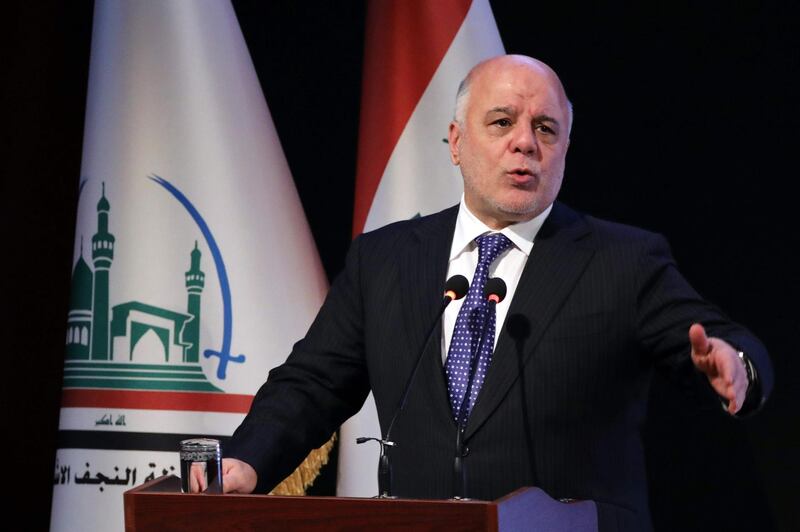Iraq’s prime minister Haider Al Abadi has said that the collapse of his own political alliance will not derail the country's upcoming general elections.
The vote, scheduled for May 12, is the first since security forces routed ISIL, but it has been thrown into doubt because of continued sectarian tensions.
Parliament will hold a session on Thursday to approve the election date.
But concern that the polls may be delayed has risen after the country’s main Sunni alliance, urged MPs to postpone it, to allow almost three million people displaced by the fighting to return to their homes.
“We will not allow interference from those who disrupt democracy for personal gain,” Mr Al Abadi said late on Tuesday, insisting the elections would go ahead as planned.
PM @HaiderAlAbadi: Our responsibility as a state is to uphold the democratic process and to ensure that the elections will be free and fair.
— Government of Iraq - الحكومة العراقية (@IraqiGovt) January 16, 2018
On Monday, the premier's Nasr Al Iraq or "The Victory Alliance", which included Al Fatih bloc — a group of powerful Shiite militias considered close to Iran, fractured just a day after its formation.
Several Al Fatih members withdrew from the coalition with some accusing their short-lived allies of sectarianism and corruption.
________________
Read more:
Abadi rules out division between Iraqi army and militias
Iraqi militias form one of the biggest political coalitions for elections
________________
Al Fatih said it will stand as a separate entity in the ballot.
The group's withdrawal came after prominent Shiite leader Ammar Al Hakim, considered sceptical of Iran's influence in Baghdad, said he would be joining Nasr Al Iraq.
Mr Al Abadi responded by saying he would not conduct negotiations with electoral blocs affiliated with armed militias.
Instead, the Iraqi leader said the political process should not be conducted along sectarian lines.
Such hopes, however, are dwindling as the head of the Sunni alliance stressed that “the elections cannot be held in areas of danger", even after ISIL's ouster.
Managing more than two million Iraqis displaced by the war is one of Mr Al Abadi’s biggest obstacles and he risks alienating Sunni voters if they are exposed to booby-traps or violence in their home areas.
"The government is determined to guarantee the safe and dignified return of all displaced civilians," Mr Al Abadi said.
The war with ISIL has uprooted nearly six million Iraqis since January 2014, with 3.4 million in March 2016 being the highest number displaced at any one time.
At the end of last year 2.6 million people were displaced within the country, according to the International Organization for Migration.
The setback to Mr Al Abadi's election strategy comes amid efforts to resolve the central government's ongoing dispute with the Kurdistan Regional Government’s over land and oil revenue sharing.
On Monday, delegates of the two sides reached an initial agreement to lift an international flight ban imposed by Baghdad on the northern region after Erbil held an unsanctioned independence vote last year.
The Kurdish prime minister, Nichervan Barzani, announced on Wednesday that Erbil and Sulaimaniyah's international airports will be allowed to resume flights if they follow regulations set by the Iraqi civil aviation authority (ICAA).
Mr Al Abadi stressed that progress had been made at the talks, adding that “Baghdad is prepared to solve all outstanding issues.”






